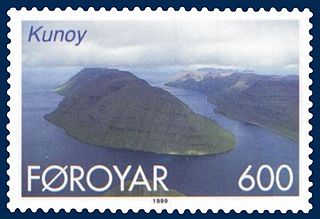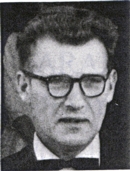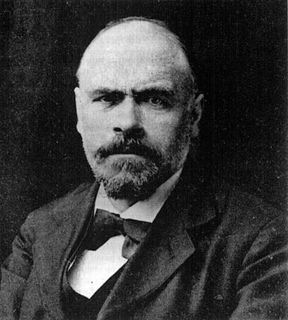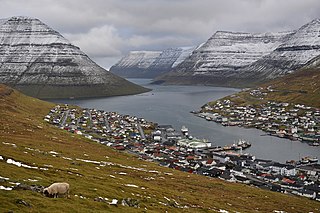
Kunoy is an island located in the north-east of the Faroe Islands between Kalsoy and Borðoy.

Skarð is an abandoned village on the east coast of the Island of Kunoy in the Norðoyar Region of the Faroes. Skarð means pass.

Jákup Dahl was a Faroese Provost and Bible translator. In 1908 he became known as a linguist with the first Faroese grammar lessons for school students.

Samuel Jacob Sesanus Olsen, commonly known as Jacob Olsen, was a Faroese teacher, writer and translator. He was deeply engaged in the local community and the Faroe Islands as a whole.
Sigri Mitra Gaïni is a Faroese poet, actress and school teacher.
Jens Pauli Heinesen was a Faroese writer. He was one of the most important novelists of the Faroe Islands. Four times he received the Faroese Literature Prize and one time the Faroese Cultural Prize. There were only a few Faroese novelists before him, there were several poets, but only a few novelists. The Faroese literature was quite new; the first novel in Faroese language was published in 1909. William Heinesen and Jørgen Frantz Jacobsen wrote in Danish, other Faroese writers, who wrote novels in Faroese were born thirty years before Jens Pauli Heinesen: Heðin Brú (1901–87) from Skálavík on Sandoy and Martin Joensen (1902–66) from Sandvík in Suðuroy. Jens Pauli Heinesen wrote in his own way, more like the spoken Faroese and not so much like the Faroese from the dictionary. As he said, he had to write in his own dialect, he couldn't write in the Sandoy dialect or in the Suðuroy dialect. He wrote about the Faroese society on its way from the old society to a modern society. He wrote critically about political issues. Sometimes he wrote partially autobiographical like in the 7 volume series of novels Á ferð inn í eina óendaliga søgu from 1980–92. Jens Pauli Heinesen was president of the Association of Writers of the Faroe Islands from 1968 to 1975

Hans Andrias Djurhuus was a Faroese poet and teacher. Hans Andrias Djurhuus was one of the most productive Faroese poets. He is well known for his national poems and for his children's songs, but he also wrote psalms, short stories, plays, fairytales and one novel.

Sverri Patursson (1871–1960) was a Faroese writer, author, and journalist. He was also a translator, ornithologist and environmentalist.
Turið Sigurðardóttir is a Faroese educator, writer and translator, specializing in the history of Faroese literature. She lives in Tórshavn and teaches at the University of the Faroe Islands.

Kristina Háfoss is a Faroese economist, lawyer, politician (Tjóðveldi) and former national swimmer for the Faroe Islands. She is the current minister of finance of the Faroe Islands.

Louis Christian Oliver Zachariasen known as Louis Zachariasen was a Faroese writer and politician for the New Self-Government party. He was the first deputy prime minister of the Faroe Islands after the islands received home rule in 1948.

Dúgvan was a Faroese monthly newspaper. It was published from January 1894 to 1928 primarily in Danish, with the subtitle afholdsblad for Færøerne 'temperance newsletter for the Faroe Islanders'. A new newspaper with the same name and purpose was also published from 1941 to 1942 in Faroese.

Andrias Christian Evensen was a Faroese priest, editor, writer, and politician for the Home Rule Party. Together with Jákup Dahl, he was one of the first to propagate the use of Faroese, including as a church language in preference to Danish.

Anna Suffía Rasmussen was a Faroese educator.

Sanna av Skarði was a Faroese educator.

Sigrið av Skarði Joensen, also Sigrið av Skarði, was a Faroese journalist, teacher, and feminist.
Niels Christoffer Winther Poulsen was a Faroese teacher and politician for the Home Rule Party.

Símun Petur Zachariasen was a Faroese teacher, editor, and politician for the Home Rule Party.

























